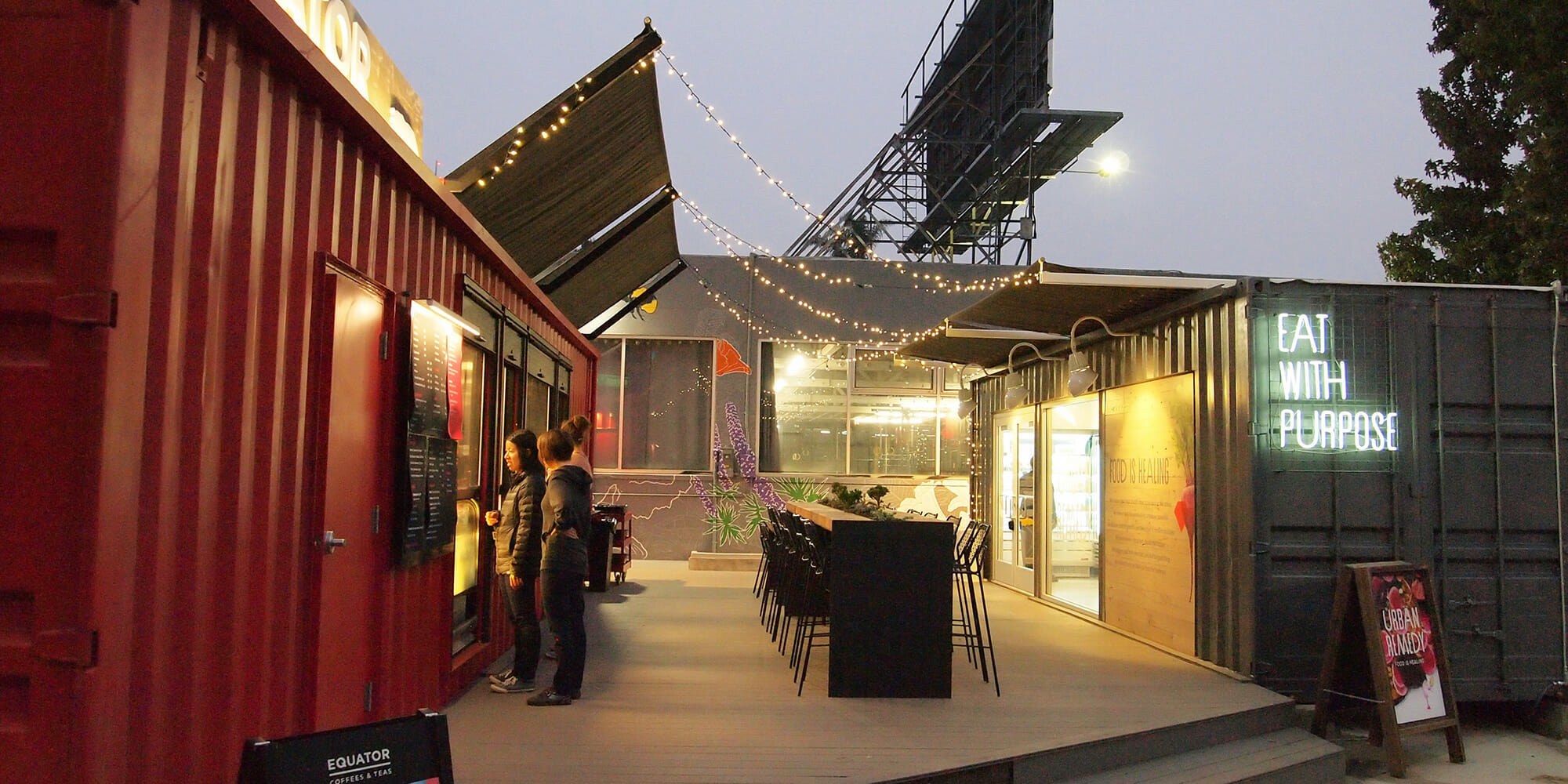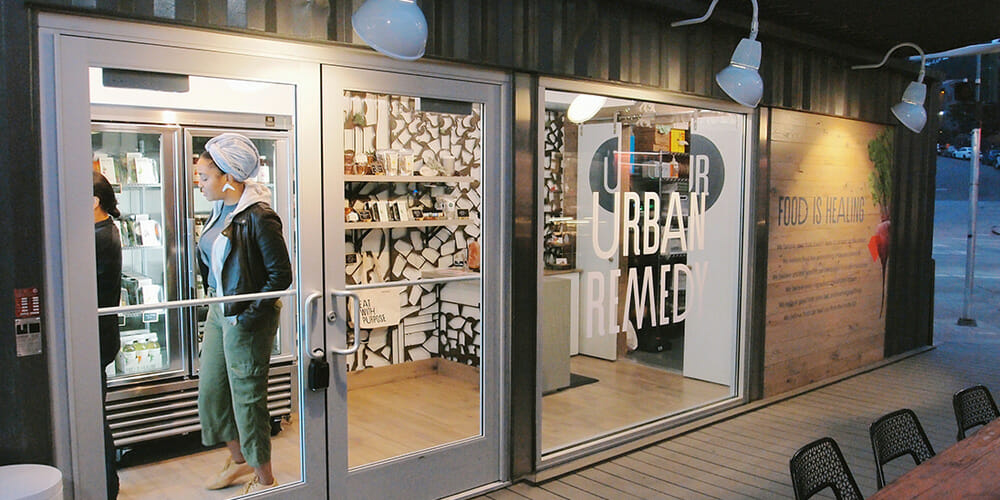From Ship to Shop: Repurposed for Retail

Harrison Street Oasis, located in Oakland, CA, aimed to provide a home for two emerging and local retail brands, Equator Coffee-a premium coffee retailer-and Urban Remedy- a boutique health food and beverage store-with a rapidly transforming downtown urban location.
The project developer saw an opportunity to transform a tiny backyard space of a remodeled building into a raised courtyard flanked by two custom commercial modular units fabricated from repurposed shipping containers. The retail units focus their energy into the public courtyard creating an intimate gathering space with tables, chairs, and shade structures to provides a welcome oasis for customers and residents alike.
The project was embraced by the City of Oakland and its residents, who have embraced ideas like ‘Urban Acupuncture.’ The utilization of “forgotten corners” in dense, urban locations to create intimate human-scale amenities that provide life and security to the streets has become a model for many other projects currently in the works.
The project was built by UrbanBloc, Inc. a northern California based container modification company, with design and engineering performed by R & S Tavares Associates. This 570 sq. ft. project took just over 100 days to complete.
Both units were constructed to become models for future roll-outs. Studies and tests were conducted both digitally and on the factory floor with the clients to define retail environment, workflow efficiency, and optimal customer and staff interactions.
Custom requirements and tolerances for equipment and infrastructure within such a constrained envelope that needed to be integrated within the overall fabrication system and then finished to an extremely high-aesthetic fit and build quality. The units were constructed to be Plug-and-Play site ready, with only foundation and utility connections in the field. All finishes and assemblies were required to withstand the flex of road transportation yet be seamless and tight as required by Environmental Health standards for food use.

Cost Effectiveness
In comparison to brick and mortar build-outs, the clients report a savings of around 50%. This is partially in design/ build costs and partially due to the revenue generation as a result of the extremely quick timeline. Looking at future projects, the savings are expected to be even greater as the prototyping efforts, permitting and production layouts have been already invested in the units and captured by our procedures.
“We see the use of modified shipping containers as building components growing in the near future,” said MBI Executive Director Tom Hardiman. “That is one of the reasons we worked with the International Code Council to develop more resources for developers and code officials interested in this process.”
This article originally appeared in the Modular Advantage Magazine - Second Quarter 2019 released in May 2019.
More from Modular Advantage
AoRa Development Aims for New York’s First Triple Net Zero Building Using Modular Methods
More cities are providing funding for newer infrastructure projects as long as they meet sustainability requirements. This is how modular can fit the bill, thanks to its lower waste production.
Developers and Designers: Lessons Learned with Modular Design
Modular construction is attractive to many developers because sitework and module construction can occur simultaneously, shortening the schedule and reducing additional costs.
UTILE: Putting Modular Building on a Fast Track
In Quebec, UTILE is taking the lead in creating affordable modular buildings to help decrease the student housing shortage. During the process, the company discovered what it takes to make the transition to modular building a success.
Sobha Modular Teaches Developers How to Think Like Manufacturers
With its 2.7 million square foot factory in UAE, Sobha Modular is bringing both its high-end bathroom pods to high-end residences to Dubai while developing modular projects for the U.S. and Australia.
RoadMasters: Why Early Transport Planning is Make-or-Break in Modular Construction
In modular construction, transportation is often called the “missing link.” While it rarely stops a project outright, poor planning can trigger costly delays, rerouting, and budget overruns.
Navigating Risk in Commercial Real Estate and Modular Construction: Insights from a 44-Year Industry Veteran
Modular projects involve manufacturing, transportation, and on-site assembly. Developers must understand exactly what they are responsible for versus what they subcontract. Risk advisors should research the developer’s contractors, subcontractors, and design-build consultants—especially the modular manufacturer.
Art²Park – A Creative Application of Modular and Conventional Construction
Art²Park is more than a park building—it’s a demonstration of what modular construction can achieve when thoughtfully integrated with traditional materials. The use of shipping containers provided not only speed and sustainability benefits but also a powerful structural core that simplified and strengthened the rest of the building.
Building Smarter: A New Standard in Modular Construction Efficiency
Rising material prices, labour shortages, expensive financing and tightening environmental rules have made conventional construction slower, costlier, and more unpredictable. To keep projects on schedule and within budget, builders are increasingly turning to smarter industrialized methods.
Resia: Breaking All the Rules
Resia Manufacturing, a division of U.S.-based Resia, is now offering prefabricated bathroom and kitchen components to industry partners. Its hybrid fabrication facility produces more precise bathroom and kitchen components (modules) faster and at lower cost than traditional construction. Here’s how Resia Manufacturing does it.
How LINQ Modular Innovates to Bring Modular To The Market in the UAE and Beyond
LINQ Modular, with an office and three manufacturing facilities in Dubai, is a modular firm based in United Arab Emirates. The company is on a mission: to break open the housing and construction markets in the Gulf Cooperation Council (GCC) area with modular.










